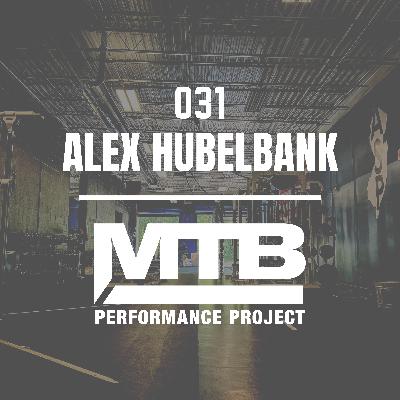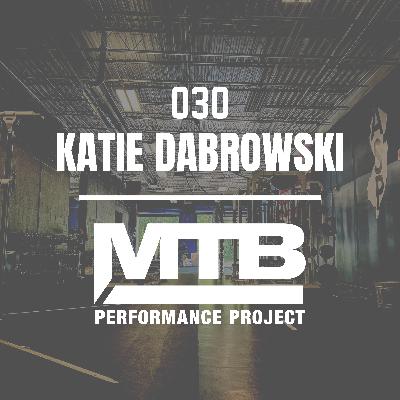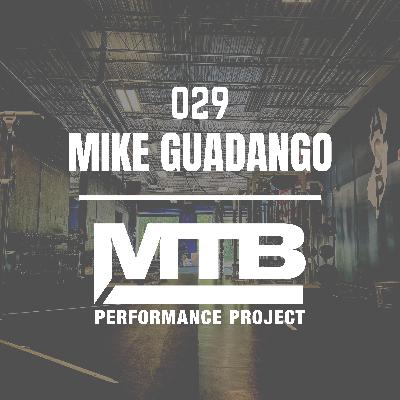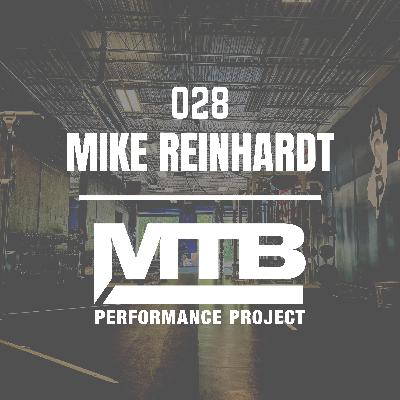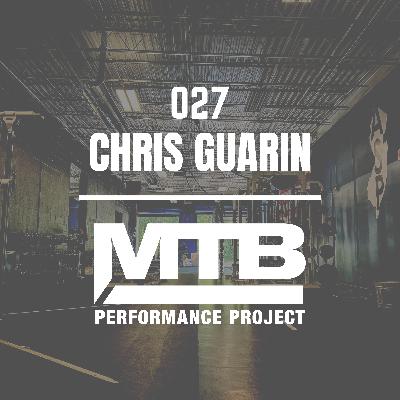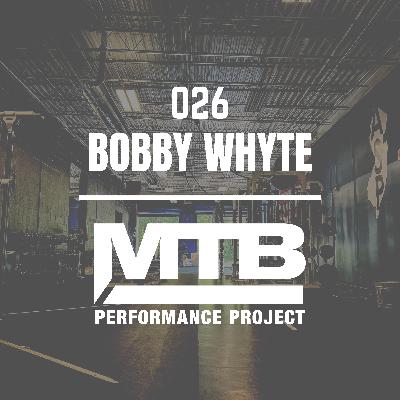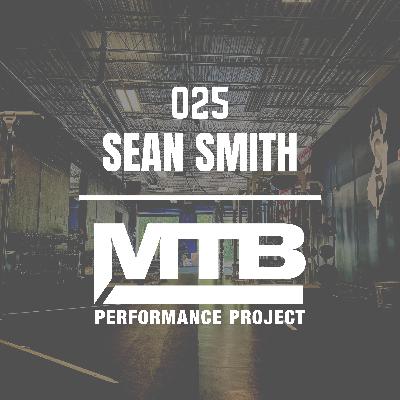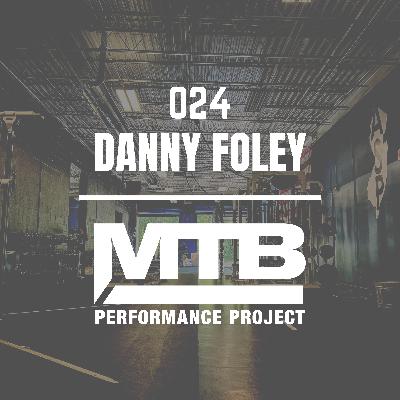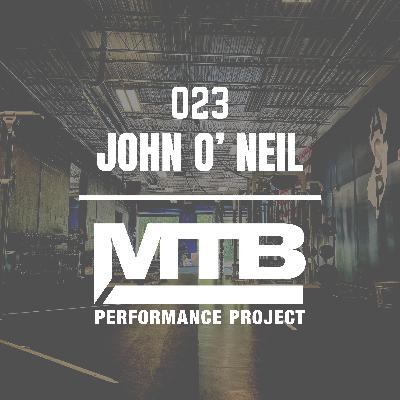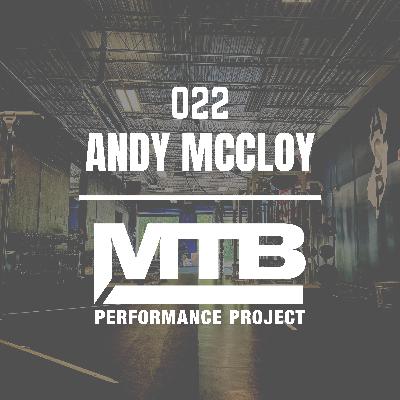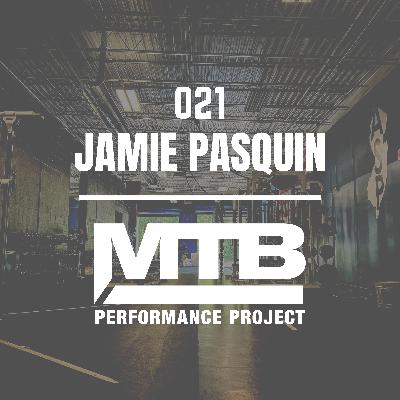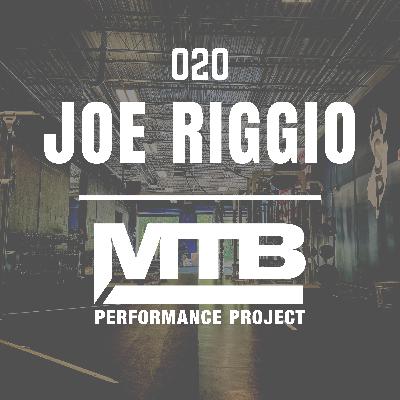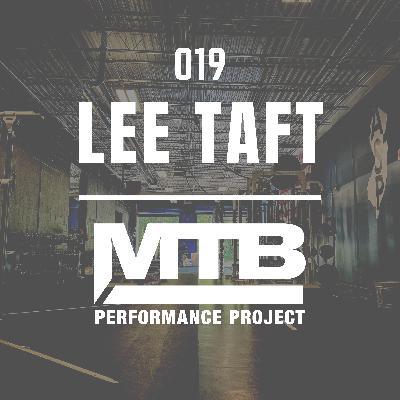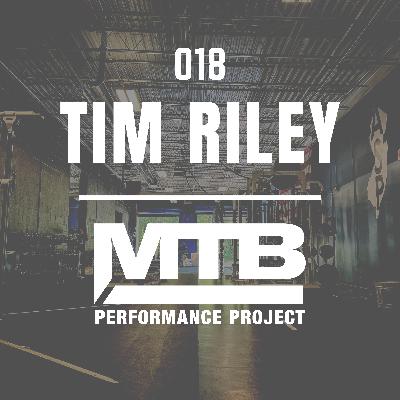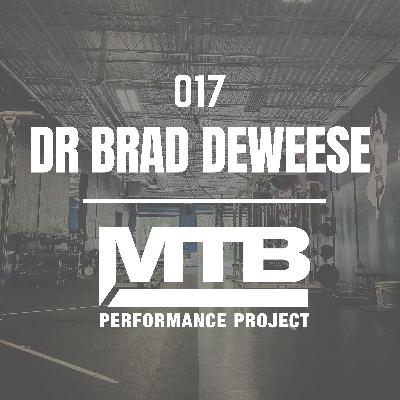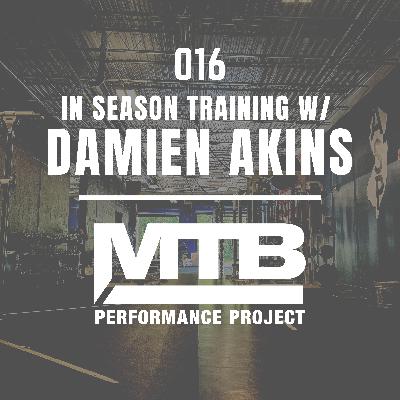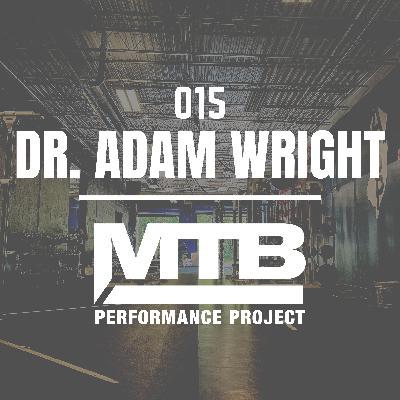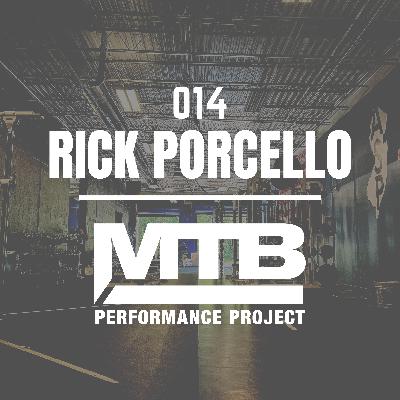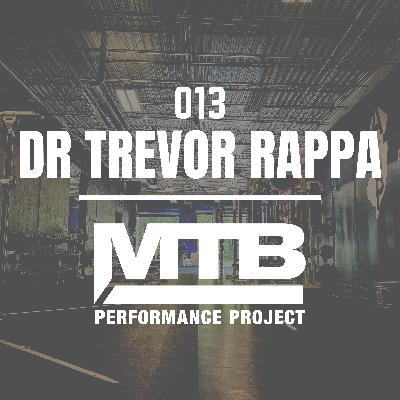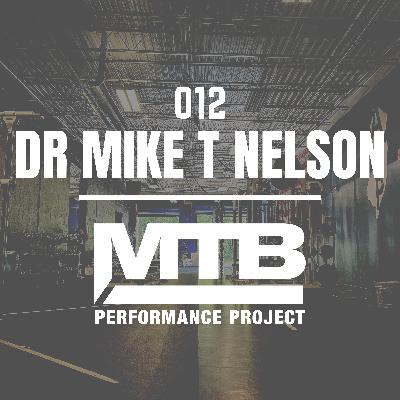Discover MTB Performance Project
MTB Performance Project

MTB Performance Project
Author: Mickey Brueckner
Subscribed: 0Played: 2Subscribe
Share
Description
Hello, my name is Mickey Brueckner (MTB) and welcome to my podcast: "The MTB Performance Project." I am the founder and CEO of the ANNEX Sports Performance Center.
I have almost 20 years of experience training athletes of all levels, running a business and building a brand. I am a husband, a father to three children, and I still train hard on a regular basis.
The main goal of this endeavor is to uncover different aspects of human performance. I believe there are many layers to this pursuit: health, fitness, nutrition, mental, social - the list goes on. However, no matter what you are chasing, the principles across many of these disciplines are universal.
Through interviewing people who I consider experts in there field, along with past and current ANNEX athletes, we can dive deeper into these disciplines and unpack different levels of performance.
I named it the Performance "Project" because for me, this is a lifelong initiative to be in constant pursuit of ways to improve my overall health and performance.
Thank you for listening.
I have almost 20 years of experience training athletes of all levels, running a business and building a brand. I am a husband, a father to three children, and I still train hard on a regular basis.
The main goal of this endeavor is to uncover different aspects of human performance. I believe there are many layers to this pursuit: health, fitness, nutrition, mental, social - the list goes on. However, no matter what you are chasing, the principles across many of these disciplines are universal.
Through interviewing people who I consider experts in there field, along with past and current ANNEX athletes, we can dive deeper into these disciplines and unpack different levels of performance.
I named it the Performance "Project" because for me, this is a lifelong initiative to be in constant pursuit of ways to improve my overall health and performance.
Thank you for listening.
31 Episodes
Reverse
In this episode of the MTB Performance Project, Mickey sits down with Alex Hubelbank, a physical therapist and performance coach who has carved out a unique career path in the world of professional sports and human performance. Alex shares her unconventional journey from working at Apple for four years to becoming a PT and eventually landing roles in professional sports, including the NBA. Her story demonstrates how non-linear career paths can actually provide valuable skills and perspectives that traditional routes might miss. Throughout the conversation, Alex discusses the importance of the "five whys" approach to understanding your true motivations, how to know when it's time to leave a position and make big life changes, and the difference between "top-down" vs "bottom-up" career approaches. She shares insights on working with professional athletes, including navigating complex stakeholder relationships between teams, athletes, agents, and medical staff, setting clear expectations, having difficult conversations, and the realities versus perceptions of working in professional sports. Alex also explores cutting-edge training technology, particularly muscle oxygen sensors that help coaches make better decisions about when athletes are truly ready for their next set or exercise. She explains how this technology is changing the way coaches approach warmups and recovery, moving away from guessing with timers to using real data about what's happening inside the athlete's body. Whether you're a coach, trainer, or athlete, Alex's story offers practical lessons on building a meaningful career, working with elite performers, and embracing new tools that can take training to the next level
In this episode of The MTB Performance Podcast, host Mickey Bruckner sits down with Katie Dabrowski, partner at Old Bull Athletics in Miami, to explore how the lines between training and healthcare are disappearing. Katie shares her journey from starting a small PT practice to building a thriving cash-based facility where you can't tell if someone is there for rehab or performance training. We explore practical strategies for working with clients in pain, the psychology behind fear during the injury rehabilitation process, and how to find "entry points" for challenging movements. Katie also opens up about the challenges of scaling a service-based business while maintaining quality care, and why she believes most training issues come down to being either undertrained or overtrained. Whether you're a coach, trainer, or business owner, this conversation is packed with actionable insights on building sustainable practices and helping people move better.
In this episode of the MTB Performance Project, host Mickey Bruckner sits down with Mike Guadango, owner of Freak Strength in New Jersey, fellow podcaster, and coach to elite athletes at all stages of their careers. Mike shares his journey from aspiring chiropractor to becoming a performance coach who integrates bodywork, acupuncture, and auto-regulated training into his unique methodology. They dive into how Mike’s early injuries led him to a career in performance and healing, and why he prioritizes fascial stretching, acupuncture, and hands-on therapy over traditional physical therapy. He breaks down his semi-private training model, where every athlete receives individualized, auto-regulated programming, and emphasizes the importance of meeting athletes where they’re at, whether they’re rookies or seasoned pros. Mike also discusses how he balances coaching passion with business growth. He shares why practices like sauna, cold plunge, and simple living are non-negotiables for health and recovery. His no-BS approach to coaching, combined with his deep care for athletes, makes this a must-listen for trainers, business owners, and anyone interested in the intersection of performance and longevity.
In this episode of the MTB Performance Project, host Mickey Bruckner sits down with performance physical therapist Mike Reinhardt to explore the intersection of rehab and athletic performance. Mike shares his journey from strength training enthusiast to PT, emphasizing the importance of bridging the gap between clinical rehab and sport-specific training. He discusses collaborative strategies for PTs and strength coaches, data-driven KPIs (like limb symmetry and force plates), and the pitfalls of overtraining or undertraining athletes. Mike also shares his passion for mentorship through his unique performance programs. Whether you’re rehabbing injuries or optimizing performance, this episode is full of insights on athlete development, mindset shifts, and the future of performance therapy. Follow Mike on Instagram (@drmike_reinhardt) and subscribe to the MTB podcast for more.
In this episode, host Mickey Bruckner interviews Chris Guarin, a performance coach and founder of Guarin Posture Performance in California. Chris shares his journey into strength and conditioning, sparked by a love for sports and shaped through personal injuries. Over time, his work expanded from athletic performance to a specialized focus on posture and movement. The conversation highlights Chris’s commitment to continuous learning and his belief in the power of context, in both coaching and life. His story offers valuable takeaways for young coaches: stay curious, build strong relationships, and keep showing up.
In this episode of the MTB Performance Project, Bobby Whyte shares his powerful journey from a self-doubting college athlete battling addiction to a respected coach and founder of Good Drills. He discusses how hitting rock bottom led him to rediscover purpose through service and sport, and how that transformation now shapes everything he does—on and off the court. Bobby breaks down his coaching philosophy rooted in honesty, environment, and athlete development over gimmicks or hype. He also talks about launching Good Drills, growing an online business, and how leaning into discomfort became his biggest growth driver. It’s a candid, motivating conversation about building something meaningful—and becoming someone you're proud of.
Sean Smith joins the podcast to break down what it really means to coach with purpose. With experience spanning NCAA Division I athletics and IndyCar, Sean emphasizes the importance of meeting athletes where they are, building real relationships, and coaching with intention. He dives into how to maximize limited off-seasons, why in-season training is essential, and how he uses force plate data and athlete feedback to build smarter, more responsive programs. Whether you're in the weight room or working remotely, Sean’s insights highlight how clarity, communication, and context shape long-term success.
In this episode, Danny Foley—founder of Rude Rock Strength and coach with Altis—shares his evolving approach to performance training. He walks us through his journey from traditional strength and conditioning to a more integrated model that blends injury rehab, performance optimization, and fascial-based training. Danny reflects on how his time working with Navy SEALs at VHP shaped his current philosophy and makes the case for closing the gap between strength and therapy to better serve athletes. From NFL combine prep to fascia-informed loading, this conversation is packed with insights on staying relevant, effective, and impactful as a coach.
Ever wonder what it really takes to turn a passion for coaching into a leadership role at a top-tier training facility? In this episode, John O’Neill—co-owner of Cressey Sports Performance—shares his evolution from a young coach to a strategic leader shaping athlete development and company culture. You’ll hear how mentorship, mindset shifts, and mastering every role from intern to executive helped John build a sustainable career in sports performance. He unpacks the realities of youth athletics, the business behind great training environments, and why empathy and leadership matter just as much as programming. A must-listen for anyone chasing longevity and impact in the fitness or coaching world.
Andy McCloy’s path in strength and conditioning is a masterclass in turning obstacles into opportunity. In this episode of the MTB Performance Project, he shares how his passion for training led him from personal struggles to building BCI Sports Performance, a thriving facility in Alabama. Andy emphasizes the importance of clarity, ego management, and continuous learning in both coaching and business. He dives into the realities of running a gym, debunking the myth of overnight success and stressing the need for long-term vision, strong leadership, and a well-defined philosophy. Now, through Built to Last Gym, his mentorship venture with Luka Hocevar, he’s helping other gym owners navigate the challenges of building sustainable, impactful businesses. Whether it’s training athletes, developing coaches, or scaling a gym, Andy’s philosophy is clear: know your why, commit to mastery, and never stop evolving.
Jamie Pasquin’s journey in strength and conditioning is all about growth, adaptability, and impact. In this episode of the MTB Performance Project, he shares how his passion for improving as an athlete led him to coaching, from high school sports to working with the Cleveland Cavaliers. Instead of chasing big-name jobs, Jamie focused on learning from the best and finding the most cutting-edge training environments. Now at Varsity House, he’s applying his experience to help athletes at all levels while learning the business side of coaching. He breaks down the key lessons from his career, the importance of building relationships, and why success isn’t about titles—it’s about constant learning and making a difference.
In this episode of the MTB Performance Project, Mickey sits down with Joe Riggio, co-founder of Varsity House and Business of Strength. Joe share his evolution from being a passionate strength coach to mastering the business side of fitness, emphasizing the critical shift from coach to entrepreneur. He discusses the hard lessons learned—like the importance of marketing, financial management, and leadership—while growing a thriving fitness business. From nearly going out of business twice to scaling multiple locations, Joe provides invaluable insights on transitioning from the gym floor to the boardroom. Whether you're a gym owner, coach, or entrepreneur, this episode is packed with actionable advice on navigating the challenges of business growth while staying true to your mission.
In this episode of The MTB Performance Project, we welcome renowned speed and agility coach Lee Taft. Lee shares his journey from physical education teacher to one of the most respected figures in athletic development. We discuss the importance of multi-sport participation, the pitfalls of early specialization, and how to create environments that foster athleticism, problem-solving, and long-term success. Lee also explains his coaching philosophy, emphasizing guided discovery, competition, and skill acquisition through play. Whether you're a coach, parent, or athlete, this conversation will challenge the way you think about training and inspire you to develop athletes who are not only faster and stronger—but also more resilient, adaptable, and passionate.
In this episode of The MTB Performance Project, we sit down with Tim Riley, Director of Sports Performance at Kollective and co-host of the Coach em' Up podcast. Tim shares his unconventional path from high school dropout to training elite athletes, highlighting the importance of mentorship, coaching experience, and continuous learning. He explains his training philosophy, emphasizing individualization, movement quality, and athlete feedback. Tim also discusses how personal growth, mindset, and self-awareness have shaped his coaching career. Tune in for valuable insights on building a career in performance training and what’s next for Tim, including his upcoming projects and seminars.
Summary Dr. Brad DeWeese, a high performance director, discusses the importance of collaboration and communication in player development. He emphasizes the need for a unifying language among different roles and disciplines in sports. Brad shares his diverse career path and the value of delayed gratification in professional growth. He also highlights the role of technology in providing objective data for informed decision-making. Additionally, he emphasizes the importance of building a culture of communication, respect, and love within a team. Brad discusses the evolution of load monitoring and advancements in technology in the field of sports science. He emphasizes the importance of understanding the human body and not over-relying on technology. Dr. DeWeese also highlights the role of high performance departments in educating and collaborating with the entire organization. He advises coaches with limited resources to focus on the basics of sleep, hydration, and nutrition. Overall, Dr. DeWeese encourages a proactive and thoughtful approach to training and workload management. Takeaways Collaboration and communication are crucial in player development, allowing different roles and disciplines to work together effectively. Delayed gratification and versatility are important in professional growth, allowing individuals to gain diverse experiences and skills. Technology provides valuable data for informed decision-making in player development, but it should be used in conjunction with the art of coaching. Building a culture of communication, respect, and love within a team fosters a positive work environment and enhances productivity. Understand the evolution of load monitoring and the advancements in technology in sports science. Avoid over-reliance on technology and prioritize understanding the human body and its responses to training. High performance departments should educate and collaborate with the entire organization to ensure alignment and success. Focus on the basics of sleep, hydration, and nutrition, even with limited resources. Take a proactive and thoughtful approach to training and workload management. Keep up with Brad on INSTAGRAM I hope you enjoy the episode ! Best, MTB
Explore the importance of in-season training for baseball players with Damien Akins and I as we discuss key strategies for transitioning smoothly from off-season to in-season training. Discover how maintaining progress throughout the season not only enhances performance but also prevents injuries, ensuring long-term development. Learn valuable insights on measuring readiness, managing intensity, and utilizing exercises to reduce soreness and nervous system stress during the season. This podcast highlights the necessity of in-season training for injury prevention and ensuring peak performance longevity in athletes. Key Takeaways : In-season training is crucial for athletes to maintain progress and reap the benefits of long-term development. Measuring readiness and managing intensity are key factors in optimizing performance during the season. Communication with coaches and utilizing tools like wearables can help athletes make informed decisions about training intensity. Choosing exercises that mitigate soreness and nervous system stress can help athletes maintain performance and reduce the risk of injury during the season. Want to learn nmore about how to work with us in season ? Check out our website : www.annexsportsperformance.com or email us : info@annexsportsperformance.com
Enhancing Mental Performance with Dr. Adam Wright In this podcast episode, Dr. Adam Wright delves into the crucial role of mental performance in achieving peak results, shedding light on the pivotal interplay between physical and mental aspects. He advocates the transition from mere mental toughness to antifragility, emphasizing the importance of equipping individuals with the skills to navigate chaos, uncertainty, and setbacks. Dr. Wright underlines the significance of fostering a supportive culture that prioritizes mental health within the realm of sports, while also presenting actionable strategies for cultivating mental resilience. These include honing awareness, boosting motivation, and engaging in psychological skills training. Furthermore, the discussion explores the traits and challenges of high achievers, debunking common pitfalls such as perfectionism, fear of failure, and reliance on external motivation. The conversation also probes into the influence of contemporary culture and technology on the mental grit of young individuals, particularly athletes, and advocates for the imparting of media literacy skills and the fostering of genuine connections to counteract the adverse impacts of social media. Moreover, the spotlight is placed on the cultivation of resilience and the teaching of delayed gratification, crucial for the holistic development of aspiring athletes. An innovative concept introduced is that of anti-fragility, urging intentional growth and the embracement of stress and setbacks as avenues for advancement. For those seeking comprehensive mental performance training, The Antifragile Academy, a valuable resource curated for athletes and individuals, is highlighted. Key Takeaways : Mental performance and physical performance are equally vital for optimal results. Transitioning to antifragility necessitates honing skills to confront chaos, uncertainty, and setbacks. Cultivating a supportive culture is paramount for mental well-being in sports. Building mental resilience involves tools such as awareness, motivation, and psychological skills training. Traits of high achievers include self-awareness, clarity in goals, emotional intelligence, and a growth mindset. Addressing pitfalls like perfectionism and fear of failure is pivotal for sustained excellence. Impact of modern culture and technology on young individuals' mental resilience. Emphasizing the cultivation of resilience and delayed gratification for young athletes. Advocating for early psychological skills training and a focus on effort rather than outcomes. Embracing anti-fragility and viewing stress and setbacks as growth opportunities. For further information and collaboration opportunities with Dr. Adam Wright, visit: Website: https://www.dradamwright.com/ The Anti-Fragile Academy: https://www.theantifragileacademy.com/
Welcome to another exciting episode of the MTB Performance Project, where high-performance athletes share their stories and insights. In Episode 14, we're treated to an exclusive interview with my friend and former big league pitcher, Rick Porcello. Let's delve into the highlights and revelations from this conversation. Multi-Sport Exposure and Youthful Development: Porcello's journey kicks off with a discussion about his exposure to multiple sports at a young age. The podcast explores how this diverse background shaped his skills and contributed to his development as a youth ball player. For aspiring athletes, Porcello's early experiences provide valuable insights into the importance of a well-rounded foundation. From High School to the MLB Draft: Listeners get an inside look at the critical decision Porcello faced when opting to forgo college and enter the 2007 MLB draft. The episode highlights the factors that influenced this bold move and delves into the mindset that propelled Porcello from high school to professional baseball in just two short years. 12 Years in the Big Leagues - Building Year Over Year: The conversation transitions to Porcello's impressive 12-year career in the Major Leagues. He shares the intricacies of his development, offering a glimpse into both the physical and mental aspects of the game. This section provides a roadmap for athletes aspiring to achieve consistent growth and success over an extended professional career. Teammate and Competitor Insights: Porcello opens up about his role as both a teammate and a competitor. Listeners gain valuable insights into his approach as a starting pitcher and the meticulous mindset he adopted to hone his craft. Aspiring pitchers and baseball enthusiasts will find this segment particularly enlightening, offering a glimpse into the mindset of a professional athlete striving for excellence. Life Beyond the Diamond: Managing Distractions: In a candid discussion, Porcello shares details about his life off the field and the strategies he employed to manage distractions. This segment serves as a valuable resource for anyone seeking tips on focus and discipline in their personal and professional lives. The MTB Performance Project's Episode 14 featuring Rick Porcello is a must-listen for sports enthusiasts, aspiring athletes, and anyone seeking inspiration from the world of professional baseball. The podcast provides a comprehensive exploration of Porcello's journey – from his early exposure to sports, the pivotal decision to enter the MLB draft, to his sustained success in the Major Leagues. Tune in for a front-row seat to the secrets of MLB success and the mindset that sets elite athletes like Rick Porcello apart. I hope you enjoy this episode! Best, MTB
In this week’s episode we talk with my friend and co-founder of Resilient Performance Physical Therapy, Dr Trevor Rappa. In today’s talk, we dive deep into his return-to-play approach for ACL injuries, how he utilizes objective and subjective measures to track progress and drive decisions in the rehabilitation process. We also get into how important the later part of the return-to-play process is in getting athletes ready for the field. Most importantly creating scenarios where we are adequately stressing our athletes and preparing them for the demands of the sport both in the rehabilitation process and performance and development. If you’re a Physical Therapist or a strength coach, you will get a ton out of my discussion with Trevor. I hope you enjoy this episode of the MTB Performance Project. Best, MTB Want to work with Resilient? Website: https://www.resilientperformance.com/ Online Learning Course: https://edu.resilientperformance.com/ Instagram: https://www.instagram.com/resilientppt/ Youtube: https://www.youtube.com/@resilientppt
Super excited about this week’s episode with Dr Mike T Nelson. Mike is a research-fueled fitness and nutrition educator, a Professor, a presenter, creator of the Flex Diet Certification Course and host of the Flex Diet podcast. We covered a bunch of topics on today's podcast from macronutrient consumption and simplifying nutrition for performance, recommendations for supplements to optimizing sleep schedules for professional athletes who compete at later parts of the day. Lastly Mike discusses his approach to cold water immersion and give some context behind the how and the why he utilizes these modalities with his athletes. So much great information from today’s talk whether you're an athlete or someone looking to create health and longevity into your life. I hope you enjoy this episode of the MTB Performance Project. Best, MTB If you want to learn more about Dr Mike T Nelson you can visit his website : miketnelson.com Please consider listening to his podcast : Flex Diet Podcast Follow Dr. Mike on Instagram : drmiketnelson


